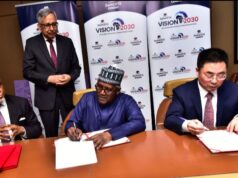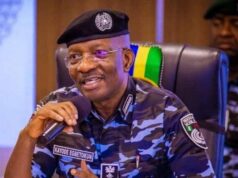
Special Adviser to President Muhammadu Buhari on Media and Publicity, Mr. Femi Adesina has observed that at no time in the history of Nigeria hate-speeches were freely used than the 2015 electioneering campaigns that ushered in Buhari.
According to him, the campaigns were loaded with open hate statements by politicians across tha board, and regretted that such statements were promoted by sections of the media.
Adesina spoke yesterday at the formal presentation of the report of the media coverage of the 2015 general elections to the public. The book is titled: “Reportage of 2015 Elections: Monitoring Scorecard of Print and Online Media.”
The Presidential spokesman, who said that the Sun newspaper which he headed then as Managing Director managed to escaped being part of promoters of such hate statements, appealed to media practitioners to always observe the ethics of journalism profession as regard the coverage of electioneering campaigns, part of which has been documented in the book.
He advised journalists, for the sake of the future exercises, to get the book, read, digest and learn from the recommendations contained in it.
He also appealed to the Nigerian Union of Journalists (NUJ) to ensure that copies of the book are widely circulated.
The project, jointly undertaken by the International Press Council (IPC) and the Nigerian Press Council (NPC), was funded by donors- EU, UKAid, the Canadian Department of Foreign Affairs, Trade and Development under the Democratic Governance fore Development (DGD) Project and managed by the UNDP.
The Presidential Media Adviser expressed happiness that the 2015 electoral process has been measured and evaluated in the publication as a guide to media practitioners in the coverage of future elections.
He acknowledged that there were lapses in the media reportage of the last general elections, but that “the negatives and positives are work in progress.”
The UNDP’s Media Advisor, Mrs. Toyin Gabriel, who also represented the DGD Project Director, expressed delight that after a long process, the IPC and NPC were able to produce a world class report that can stand the test of time.
She said that the project was undertaken meticulously with a view to proving that there are Nigerian institutions that can deliver high value project.
Mrs. Gabriel said the stake was very high to deliver a product that the sponsors can be proud of and thanked the contributors for a job well done.
In his review prior to the presentation, the Director, International Press Centre, Mr. Lanre Arogundade, said the scope of the project covered six-month period from November 2014 to April 2015.
A Professor of Communication in the Media and Development and Dean of the College of Social and Management Sciences, Caleb University, Imota, Lagos Professor Nosa Owens-Ibie, delivered a key-note address before the book presentation.
Professor Owens-Ibie who is also the General Secretary of the Association of Communication Scholars & Professionals of Nigeria (ACSPN), said in the papaer, titled: “Ethics in Election Reporting: Looking into the Future,” noted that ethics is in retreat and that unspeakable tumult and the logic of ethical universals is being threatened by both undercurrents and crosscurrents in the public and private spheres, defying description.
“The other day, a journalist was cursing his publisher for what in my interpretation translated to the triple trouble of feeding the demon of unethical practices by staff, insensitivity and greed. That is a scenario of practice at a time when the logic of mediatization suggest an impactful interface between journalism and media and electoral and political processes.
“Lanre Arogundade once admitted the tremendous intimidation journalists suffer from the coalition of publishers, politicians and security agencies in the course of reporting electoral conflicts.” The university don joxtaposed the ethical question with what he called “limitations in the environments of operation” which he said “in my findings, in a study among print journalists’ years ago, showed as tilted towards the journalism of convenience, especially, given non-payment of regular salaries in some media organizations and the recourse to moonlighting and reliance on news sources for financial lifelines.”
Professor Owens-Ibie also took a look at example of journalism ethical practices in other countries, saying that when Frog Books published a pamphlet – “The Rape of News” in February 2003 following the decision of The Times of India to market editorial space in its newspapers and based on the concern about what therefore translated to the newspapers tacit endorsement of the erosion of ethical values, Frederick Noronha interviewed Sunil Poolani, editor of Frog who admitted that the trend of news for those who have an interest to protect and can afford it was thriving.
“That The Times took the lead meant that the joiners lined up though not as blatantly as the pioneer. The rise of “Brand Journalism” has also considerably blended the predictable domain of good old advertorials, “special projects” and the general rubric of advertising with the more sophisticated and incremental consolidation of the private drivers of the economy and political space as determinants of the news we read as emanating from the professional mill.” He said that the Brand building, using credible journalistic sources to shape profiles is a blue-chip industry which now assures website hits and possibly what or who could trend, including political office holders and aspirants.
“David Deacon, John Downey, James Stanyer and Dominic Wring’s assessment of news media performance in the 2015 General Elections in the United Kingdom highlighted the bias of news media in favour of the Conservatives and the issues they canvassed and hostility to other political parties and leaders while television coverage tilted in favour of “three main party leaders” and “two main parties”. There was according to them, a deficit of attention to substantive issues.”
On the Home Front, the Professor noted that one of the defining features of the consolidation of this phase of Nigeria’s transition is the discernible building blocks to the emerging media to which various stakeholders are making subtle and visible inputs.
According to him, there is a growing body of data that is taking the discussion beyond the realm of the anecdotal, adding that the collaboration between the International Press Centre (IPC) and the Nigerian Press Council (NPC) monitoring 22 newspapers, four online media and three social media platforms between November 2014 and April 2015 on the reportage of the 2015 elections produced definitive insights, including on the primacy of issues of ethics as a core of journalistic practice.
He said that the Nigerian Democratic Report provide critical information for an assessment of levels of subscription to ethical principles in the electoral process by the media
“The baseline survey of six newspapers ahead of the 2015 elections found that politicians actually set the agenda on the coverage of electoral issues and that reports lacked investigation, relying more on publicity materials from politicians. The monthly monitoring reports showed that ethical breaches had a direct relationship with the contest for political power with a variable performance showing general restraint by regional newspapers from publishing inciting, non-conflict sensitive headlines, hate speech and reports with stereotype even in the heat of the campaigns while virtually all the reports of infractions in this domain were by national newspapers. Political advertorials were used in attacking opponents. Online media and social media platforms tended like the regional papers to have been more conflict-sensitive with no record of hate speech, sensational headlines or stereotype expression until March 2015. By April when the elections had ended there was no report on hate speech or stereotype in either national or regional newspapers.
“Ayo Oluwatosin’s assessment of the marketing of parties, candidates and issues in the 2015 elections at the 8th edition of the empowerment series of the Association of Communication Scholars & Professionals of Nigeria (ACSPN) highlighted the fact that the election was a money spinner for the Nigerian Press with their January to April 12, 2015 revenues roughly equivalent to what they made cumulatively in the previous 24 months with some newspapers averaging a daily income of N30 million. The temptation to make hay was enormous with a variable scorecard of breaches due to financial considerations and a pandering to other primordial sentiments, especially based on ethnicity and religion. It was not just a case of the end justifying the means; the means in all cases of infraction of ethics appeared to have justified the end. The issue had apparently gone beyond the old debate on the propriety of the professionalism of the wrap-around for flagship print media to that of how far each medium was willing to go.” [myad]
Home NEWS 2015 Poll Level Of Hate-Speeches In 2015 Campaigns Unequaled, Adesina Notes: Cautions Media On...






